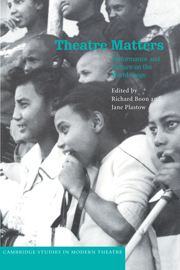Book contents
- Frontmatter
- Contents
- Notes on contributors
- Foreword: A letter from Kingston
- Preface
- Acknowledgements
- 1 Introduction
- 2 ‘The Revolution as Muse’: drama as surreptitious insurrection in a post-colonial, military state
- 3 Making theatre for a change: two plays of the Eritrean liberation struggle
- 4 Race matters in South African theatre
- 5 Dreams of violence: moving beyond colonialism in Canadian and Caribbean drama
- 6 The French-speaking Caribbean: journeying from the native land
- 7 ‘Binglishing’ the stage: a generation of Asian theatre in England
- 8 Popular theatre for the building of social awareness: the Indian experience
- 9 The promise of performance: True Love/Real Love
- 10 Making America or making revolution: the theatre of Ricardo Halac in Argentina
- Index
10 - Making America or making revolution: the theatre of Ricardo Halac in Argentina
Published online by Cambridge University Press: 25 October 2009
- Frontmatter
- Contents
- Notes on contributors
- Foreword: A letter from Kingston
- Preface
- Acknowledgements
- 1 Introduction
- 2 ‘The Revolution as Muse’: drama as surreptitious insurrection in a post-colonial, military state
- 3 Making theatre for a change: two plays of the Eritrean liberation struggle
- 4 Race matters in South African theatre
- 5 Dreams of violence: moving beyond colonialism in Canadian and Caribbean drama
- 6 The French-speaking Caribbean: journeying from the native land
- 7 ‘Binglishing’ the stage: a generation of Asian theatre in England
- 8 Popular theatre for the building of social awareness: the Indian experience
- 9 The promise of performance: True Love/Real Love
- 10 Making America or making revolution: the theatre of Ricardo Halac in Argentina
- Index
Summary
In the twentieth century the balance between democracy and military dictatorship in Argentina has been precarious at best. John Simpson and Jana Bennett, writing in The Disappeared, report that ‘between 1930, when the military first intervened in government in Argentina, and the overthrow of Isabelita Perón in 1976, there had been six coups and 21 years of military dictatorship’. In that 36-year period, only one civilian administration lasted for a full term. That Buenos Aires, a city that is strikingly beautiful and essentially European in its ambiance, should be subject to such political vagaries is one of the ironies of the western hemisphere. Since the nineteenth century a great number of essays, novels and plays have dealt with the whimsies of Argentine politics, including the famous treatise of Domingo Faustino Sarmiento, Civilización o barbarie o vida de Juan Facundo Quiroga (1845), which pointed to the root problem in reflecting the bloody dictatorship of Juan Manuel de Rosas from 1835 to 1852 with its legacy of exiles and political murders. The massive European migrations of the late nineteenth century, however, invoked a new and promising image of seemingly unlimited land and opportunity. As millions of Italians, Spanish, Germans and other nationality groups flooded into Argentina, nearly dwarfing the existing population, the ethnic, linguistic and cultural mixture produced an inordinately rich potential for economic growth and development. Regrettably, the political stability that could have supported such expansion failed to develop at the same pace, and violent changes in the government came to characterise the twentieth century as well.
- Type
- Chapter
- Information
- Theatre MattersPerformance and Culture on the World Stage, pp. 177 - 198Publisher: Cambridge University PressPrint publication year: 1998

